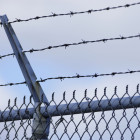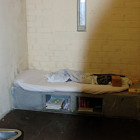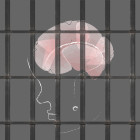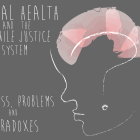
Illinois DJJ Awaiting Expert Report on Mental Health
|
Is the Illinois DJJ providing adequate & required mental health and education services? Some are saying no.
Juvenile Justice Information Exchange (https://jjie.org/tag/mental-health-substance-abuse/page/4/)

Is the Illinois DJJ providing adequate & required mental health and education services? Some are saying no.

Jaime has spent a year behind bars at Kewanee, where, at 14, he is the youngest inmate, and he has yet to be assessed by the prison, his mother says. Without an assessment he cannot receive more than the most basic therapy, and according to his mother, Jaime is not doing well.

Too many kids are starting to use alcohol and drugs, addiction rates are soaring and lives are being destroyed. Now is the pivotal moment to bring these issues front and center.

Is Calif. lock-up deliberately and illegally depriving wards of education as part of a solitary-confinement regimen?

The de-emphasis of mental health funding is not an aberration across the United States. From 2009 until 2011, 31 states enacted major mental health budget cuts.

Grace Bauer had her entire world turned upside down when her son entered one of the nation’s harshest juvenile justice systems. Fueled by a burning desire to alter the system, she soon became one of the nation’s most impassioned crusaders for sweeping juvenile justice reform. Editor Note: This story is a continuation of the series Mental Health and the Juvenile Justice System: Progress, Problems and Paradoxes. Readers may also be interested in visiting the Juvenile Justice Resource HUB for more information about mental health and the juvenile justice system. --
The death of Grace Bauer's mother in 1998 triggered a cycle of grief that fully consumed her life for the better part of 15 years. “It became the mark we would measure time by,” she said. The pain, she said, was especially severe for her eldest child, Corey, who was 11 when his grandmother died.

Are young people in the juvenile justice system with mental health disorders being properly diagnosed and treated?

In a pair of feature stories published yesterday, (on Georgia's reform efforts and issues and two young men in the system) JJIE described two modes of intensive at-home treatment that show great promise to improve outcomes for emotionally disturbed youth in the delinquency system, both of which cost far less than incarceration or treatment in a residential treatment center.

Georgia leaders are embracing reform in juvenile justice, but serious gaps and significant roadblocks still prevent many emotionally-troubled youth from receiving the best and most cost-effective care.

Over the past three decades, adolescent development scholars, criminologists and mental health practitioners have achieved a breakthrough – or rather two breakthroughs. They have developed two different approaches to the care and supervision of troubled and delinquent children that consistently work better and cost less than correctional confinement and other commonplace services. One approach, which involves intensive and highly-regimented family therapy delivered to young people in their own homes, has been rigorously tested in scientific evaluations and repeatedly yielded substantial and statistically significant reductions in recidivism and treatment/confinement costs. The second – known as wraparound – targets youth with serious emotional disturbances, and it assembles a team of caring adults to devise an appropriate mix of community-based services in lieu of placing the child into a residential facility. Numerous studies show that wraparound, too, improves behavioral health and reduces involvement in the justice system – and does so at a fraction of the cost of confinement or residential treatment.